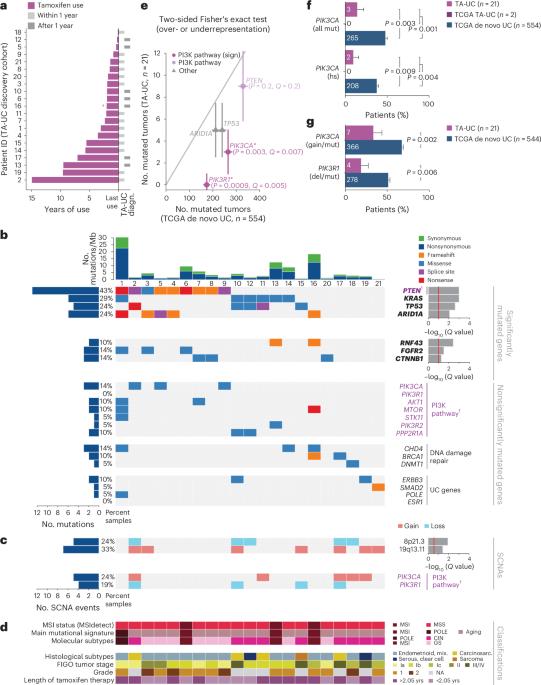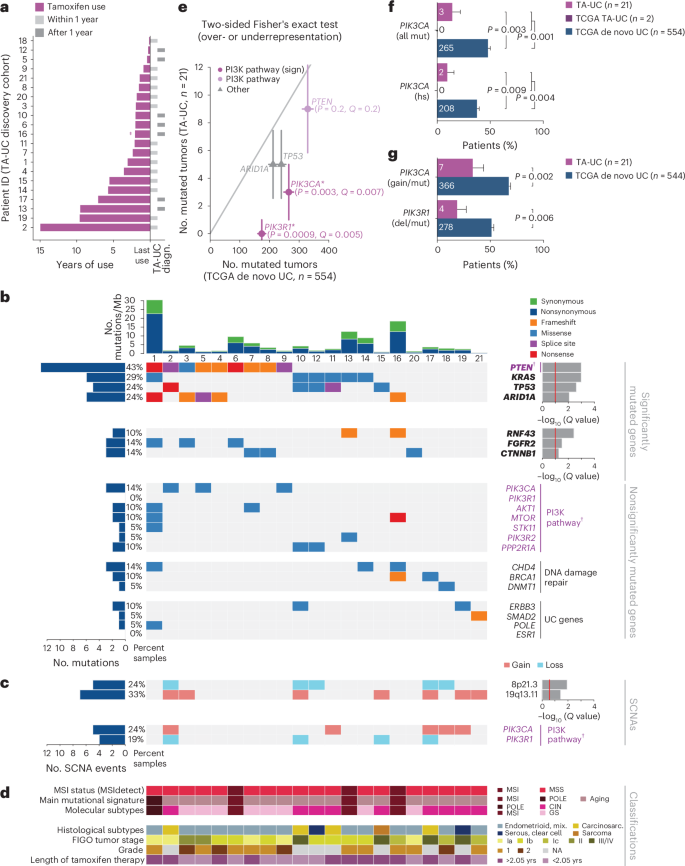他莫昔芬诱导子宫癌中PI3K的激活
IF 29
1区 生物学
Q1 GENETICS & HEREDITY
引用次数: 0
摘要
致突变过程和克隆选择有助于治疗相关继发性肿瘤的发展,这是癌症治疗的已知并发症。他莫昔芬治疗与继发性子宫癌之间的关联并不常见,但已得到充分证实;然而,他莫昔芬驱动的肿瘤发生的遗传机制仍不清楚。我们发现致癌PIK3CA突变在自发发生的雌激素相关的新生子宫癌中很常见,但在他莫昔芬相关的肿瘤中却很少发生。在体内,他莫昔芬诱导的雌激素受体刺激激活了正常小鼠子宫组织中的PI3K信号,潜在地消除了PI3K激活突变在他莫昔芬相关子宫癌中的选择性益处。总之,我们提出了一个独特的治疗相关癌变途径,其中他莫昔芬诱导的PI3K通路的激活作为一个非遗传驱动事件,促进了子宫癌发生的多步骤模型。虽然这种PI3K机制是他莫昔芬相关子宫癌所特有的,但治疗诱导的信号事件的概念可能对其他肿瘤发生途径具有更广泛的适用性。本文章由计算机程序翻译,如有差异,请以英文原文为准。


Tamoxifen induces PI3K activation in uterine cancer
Mutagenic processes and clonal selection contribute to the development of therapy-associated secondary neoplasms, a known complication of cancer treatment. The association between tamoxifen therapy and secondary uterine cancers is uncommon but well established; however, the genetic mechanisms underlying tamoxifen-driven tumorigenesis remain unclear. We find that oncogenic PIK3CA mutations, common in spontaneously arising estrogen-associated de novo uterine cancer, are significantly less frequent in tamoxifen-associated tumors. In vivo, tamoxifen-induced estrogen receptor stimulation activates phosphoinositide 3-kinase (PI3K) signaling in normal mouse uterine tissue, potentially eliminating the selective benefit of PI3K-activating mutations in tamoxifen-associated uterine cancer. Together, we present a unique pathway of therapy-associated carcinogenesis in which tamoxifen-induced activation of the PI3K pathway acts as a non-genetic driver event, contributing to the multistep model of uterine carcinogenesis. While this PI3K mechanism is specific to tamoxifen-associated uterine cancer, the concept of treatment-induced signaling events may have broader applicability to other routes of tumorigenesis. Sequencing analysis of tamoxifen-associated uterine cancers and further in vivo analyses suggest that the drug tamoxifen can activate the PI3K pathway in the absence of oncogenic mutations.
求助全文
通过发布文献求助,成功后即可免费获取论文全文。
去求助
来源期刊

Nature genetics
生物-遗传学
CiteScore
43.00
自引率
2.60%
发文量
241
审稿时长
3 months
期刊介绍:
Nature Genetics publishes the very highest quality research in genetics. It encompasses genetic and functional genomic studies on human and plant traits and on other model organisms. Current emphasis is on the genetic basis for common and complex diseases and on the functional mechanism, architecture and evolution of gene networks, studied by experimental perturbation.
Integrative genetic topics comprise, but are not limited to:
-Genes in the pathology of human disease
-Molecular analysis of simple and complex genetic traits
-Cancer genetics
-Agricultural genomics
-Developmental genetics
-Regulatory variation in gene expression
-Strategies and technologies for extracting function from genomic data
-Pharmacological genomics
-Genome evolution
 求助内容:
求助内容: 应助结果提醒方式:
应助结果提醒方式:


